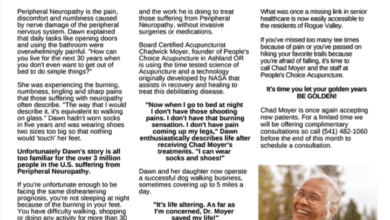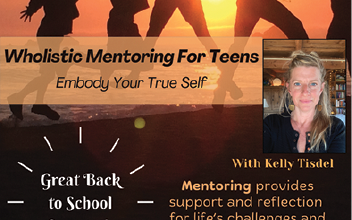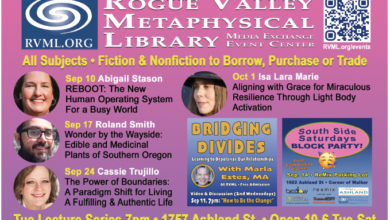Ajana Miki ND, LAc Ashland Natural Medicine
Dr. Ajana Miki has served patients in the Rogue Valley area for the past 15 years specializing in Women’s Healthcare. She currently practices at Ashland Natural Medicine. Originally trained as an herbalist, Dr. Miki holds a diverse skill set as a Naturopathic Doctor and Acupuncturist with training in a wide variety of additional healing modalities, including Holistic Pelvic Care™ and Chi Nei Tsang (abdominal massage). In today’s interview, I speak with Dr. Miki about her passion for natural medicine and her practice here in Ashland.Dr. Miki, thank you very much for taking the time to speak with me today. To begin with, will you please tell us a little bit more about yourself?
I graduated from naturopathic medical school in 2000 and decided to move from Portland where it seemed like there was a naturopath on every corner. I moved to Chicago, where there were two naturopaths in a city of 2.5 million people. It was a wonderful experience and a rapid immersion for me as a naturopathic doctor. I had a full practice within a few months and many interesting cases. It was exciting to work with people who had little exposure to natural medicine. Naturopaths were not licensed in Illinois at the time, meaning that I couldn’t do things like prescribe medications and run labs. So, I learned to use my skills of observation and intuition and I discovered that the simplest interventions are often the most effective. One of my favorite stories is about a couple who came in to make a report after implementing their protocol for three weeks, which included some dietary changes. Between them, they had no more chronic migraines, digestive issues or joint pain, and overall, they were feeling much better. Except on weekends. When I looked puzzled at them, they told me that on Friday night they “celebrated” by indulging in all of their favorite forbidden foods at once and spent the rest of the weekend feeling miserable. Ah, human nature! I loved Chicago for its diversity, incredible music scene, and delicious food. Eventually, the mountains and a longing for like-minded folks called me back to Oregon.

Dr. Miki, you were originally trained as an herbalist. How did this training shape and direct your approach as your career continued?
Herbalists can be an eccentric group of folks! I was 18 years old when I started my studies and was greatly and indelibly influenced. I spent many rapt hours learning from the stories of elders who lived close to the land in harmony with nature’s rhythms and who also relied on natural remedies to keep their body healthy and balanced. I was particularly inspired by the herbalist, Susun Weed, at whose instruction, I discovered how truly magical it is to be in a female body. It was a life-changing moment when I chose to join a circle of women sitting under a giant oak tree. That day we learned about herbs that support the female hormonal system and how to support the female body during times of menstruation, fertility, pregnancy, birth, and menopause. On the second morning, we passed around a talking stick. In our sharing, we discovered that each of the dozen or more women in the circle had begun to menstruate. Overnight, our cycles had synchronized. At the time, I didn’t know what it meant but I felt a wonderful sense of belonging. From that experience, I knew that whatever I did, it would involve working with women, herbal medicine, and the cycles of life.
Dr. Miki, will you please talk about your approach and philosophy to healing?
Basically, I see the body as a brilliant and purposeful organism. I believe that our unresolved emotional history is held and represented in our cells and organs. When a symptom appears in the body, it is like our vehicle’s dashboard light, alerting us to a deeper issue. If we can access the underlying message, miracles can happen. Last year, I had a patient with sharp pain in her bladder during urination. This had been going on for some time and it was very worrisome. We hadn’t been able to find anything with lab tests or imaging. I then asked her body to show her what it was holding. She was fortunate enough to have a sense of what it was. With the illuminations of images and emotions, she left the office pain-free. We can’t always link things to a traumatic moment or a buried emotion but when we do, it can bring great relief. Fortunately, we have many ways of deactivating the alarm systems!I am always looking for the deepest obstacles to healing. For example, say there is a chronic infection showing up and we treat it with herbs. Without addressing the underlying cause of the infection, it may go away for a while, but it or a different symptom will come back. Instead, a better approach is to follow it to the underlying source. What is causing the immune system to be working inefficiently? What is causing the hormones to be out of balance? What is causing the nervous system to remain in a state of high alert? What simple interventions can we employ to bring things back into harmony?
What would you say your core skills are, and why?
I love being a doctor because it is essentially detective work. Getting to the root cause of what is going on is my passion. Sometimes this means gently working with tender emotions. Sometimes it means running specific tests to discover which systems are in need of support and why. As a naturopath and an insatiable learner, I am constantly open to discovering new ways of understanding the body’s systems and using the simplest and most elegant treatment modalities. My core skills are listening carefully to the patient, trusting that the reason for their symptoms is discoverable, and knowing when to stay steady with the patient in their treatment, and when to change course with them. I often refer to myself as a coach and cheerleader.
Over the past 15 years, you have specialized in women’s health care. Please say more.
Honestly, what keeps me engaged in my practice is my patients. They are extraordinary people and I am motivated to help them so they can bring their gifts to the world. Every time a woman returns and reports that she has more energy than she has had in years, or that she is pregnant after having given up hope, or that she has stopped having mood swings and hot flashes and feels “like herself” again, it reminds me of why I choose to do this work.
You are now offering expanded services and availability in your practice with Ashland Natural Medicine. Please give us an overview.
I joined Ashland Natural Medicine a year and a half ago, partly because I wanted to offer my services as a gynecologist and partly because Ashland Natural Medicine felt like a perfect place for me to practice. I continue to function as a general practitioner and an acupuncturist but have expanded my services to offer gynecology and hormonal assessment. To be honest, going through menopause myself, felt like a rite of passage. The experience expanded my passion for women’s health to include the complex realm of hormones and it gave me a desire to help others go through the transition with greater ease and support.
Dr. Miki, what do you see are some of the primary reasons your clients choose to work with you?
It is always most challenging to see oneself, but I’ll share a common scenario. Yesterday, I was waiting by the front desk, giving my patient a moment alone in the treatment room to gather herself and her belongings before she came out. She emerged from the room looking 100% more relaxed and peaceful than when she entered. She had tears in her eyes and she looked ten years younger. There is nothing more gratifying!
Please talk about the quality of the relationship you form with your patients.

My patients are incredibly important to me. When someone comes in to see me, I am making a commitment to be a partner on their journey to well-being. I err on the side of relating with my patients from my heart as well as my mind. I can’t help it. Being a patient is a very vulnerable position. I honor the courage it takes for someone to sit in a chair and share things with a relative stranger that even their closest friends don’t know. I get to be in the position of having years of experience and confidence in the inherent wholeness of the patient sitting in front of me. We all are unique beings having similar experiences. We all have wounded places and fears, and underneath, we all are intrinsically ok.
What are some comments or feedback you receive from your patients?
I think what is most important to me is that my patients feel safe. And that they know I am really listening and I really care. This is frequently reflected back to me. Not only in the way that my patients open up to me, but also in their comments to the front desk staff as they leave from their appointments.
Dr. Miki, your skillset is very eclectic. Were you always this way?
I’m pretty certain that I was born this way! My natural state is to be curious and interested in a lot of different things. One of my favorite quotes is from the poet David Whyte, who said, “living at the frontier of one’s life”. When I heard that quote, I said, “That’s it!” I naturally gravitate towards the frontier of medicine, as I do with all aspects of my life. I love learning new things! If you look at my nightstand right now, there is a stack of books. I’m always studying. Dr. Chris Chlebowski and I are both headed to a training in a couple of weeks to study the CranioBiotic Technique. This modality uses specific reflex points on the body to alert the brain to places of imbalance so that it can direct the body’s energy towards more efficient healing.
How does this shape your worldview and approach to working with patients?
I see each person as a new frontier. I don’t expect patients with similar issues to need the same treatment or to respond in the same way. I am constantly investigating how and why a patient is reacting in a certain way and I am excited to find what works best for them.
How did you learn to pay attention to the new and not get stuck in presuming or assuming?
I strive to always stay present and see things with fresh eyes. I learned early in my life that this is what I desired from others. I studied psychotherapy where I learned to simply and deeply listen to the person in front of me without judging, making up stories, or formulating a response. As a life-long meditator, this comes fairly naturally. I find that the magic happens in the space between the words. Eventually, the patient will give you all the keys to the puzzle if you just allow them space and attention.
Tell us about your life outside of your practice.
I have a wonderful partner and many close friends. I love to hike and backpack and to explore old and new places. I recently joined the vinyl revolution and we have found ourselves touring the vaults of 60s and 70s rock and roll. I especially love music that I can’t sit still to! Occasionally inspiration strikes and I pick up a paintbrush or write a poem. On the weekends, I strive to balance exploration with spaciousness. Most mornings start with some time on the meditation cushion, which sets the stage for appreciating the mystery and adventure of every day.
Dr. Miki will you please give us a brief overview of the services provided by Ashland Natural Medicine?
Dr. Chris Chlebowski and I are the primary docs at Ashland Natural Medicine. Dr. Chris, as his patients refer to him, is a naturopath and chiropractor. He is also a brilliant homeopath and pediatrician. He specializes in working with people with chronic illnesses such as Lyme disease, chronic viral infections, cancer, autism, and autoimmune diseases to name a few. He has developed drugless ways to treat Lyme and chronic infections that have demonstrated exciting results. (Which I get to share with my patients as well!)We are a wonderful compliment to each other and confer throughout the day, sharing expertise. We often work in tandem with patients. My focus leans more towards gynecology, addressing hormones and neurotransmitters, while also offering acupuncture and Holistic Pelvic Care™. We have a nursing staff to offer IV therapies – vitamin/mineral and immune formulas, heavy metal chelation, glutathione, and B12 injections. Next month, I will be attending a training in IV Ozone therapy. We are excited to add this to our menu of services for our patients. We have a full medicinary onsite to provide our patients with custom herbal tinctures, homeopathic remedies, and supplements. We also offer Hyperbaric Oxygen therapy, BEMER therapy, and glutathione nebulizer treatments for compromised lungs. AND we have two wonderful massage therapists on staff!
I am curious to hear more about your process of working with your client.
Sometimes things are fairly straightforward and a simple intervention does the trick. That is a pleasure for me and for the patient. When this happens, we recommend that as long as things continue to go well, the patient comes back in six months for a check-in. My focus is on preventative medicine, so regular doctor’s visits are encouraged as an optimal way to stay connected and catch imbalances before they turn into bigger problems.When a more complex set of symptoms are present, my job is to connect the dots and offer the most elegant solution possible. Yesterday, Natasha Sol, ANM’s clinic administrator, came into my office to ask a question. She found me with papers and notes covering my desk as well as my treatment table. “Is this how you work?!”, she asked, looking startled. This isn’t usually the case, but I happened to be working with a patient with a complex set of symptoms and was doing a sort of mind mapping process to create a clear plan of action. My process involves looking at the order of importance of a patient’s symptoms and treatment, consideration of the levels in their lab tests, and taking a patient’s genetic predisposition into account. Compromising the support of one system can put undue pressure on another. The goal is to formulate a simple plan, implementing things in a methodical way so that we can assess which intervention is having what affect.
How do you manage and work with the patient’s expectation and process?
It is important to set realistic goals and expectations. For example, when we are working with an irregular menstrual cycle, it can take up to three months to know if an intervention is working. It helps the patient to be… well, patient. It can take the body some time to repair and rebuild its reserves. The longer a symptom has been present, the longer it can take to turn the ship around, so to speak. Regular check-in doctor visits can really help. It is very common for a patient to report that nothing has changed but upon review of the chart note from their previous visit, we find that 5 out of 10 initial complaints have subsided.
Please talk about your use of testing.
Lab testing provides clarity on where we need to focus our attention. There are many wonderfully accurate tests and qualified labs available so that we don’t have to waste our precious time with guessing games. We can make educated choices about which tests to run and get information quickly. This, in turn, helps us to offer a more effective, targeted treatment plan. For years, we had to rely on blood work to assess hormones. Hormones are pulsatile meaning they change throughout the day. There is not necessarily a direct correlation between what is circulating in the blood and what is going on in the tissues. Now we have access to saliva testing which tells us about the actual bioavailable hormone levels. Also, urine testing tells us how the body is metabolizing hormones. We can get a clearer picture of what is out of balance and how to fix it. This makes our interventions safer, more effective, and helps us to reroute patterns that were heading towards inflammatory states thus preventing the expressions of things like cancer and endometriosis.

Dr. Miki please tell us about the support network that you utilize to help you do all that you do.
I can’t say enough good things about the staff at Ashland Natural Medicine. Natasha Sol, who is a Reiki Master healer, is our incredibly competent clinic administrator. Lisa Hillenbrand is our amazing receptionist at the front desk. Ute is our wonderful registered nurse and Alima is our inspired medicinary manager. They are the oil that keeps the ANM machine finely tuned. Maybe there is a better metaphor, but you get the gist. They strive to serve our patients and keep things running smoothly so that we can do what we do best. And I can’t forget the rest of our ANM family, our noteworthy massage therapists, Brook Golling and Natalia Newman! Come judge for yourself! Honestly, it’s very common for our patients to linger on their way out of the clinic and I’m pretty sure it’s the atmosphere created by the staff!
Thank you very much for taking the time today to share with us. Do you have any last thoughts or comments you would like to share with our readers?
It was a pleasure speaking with you, Shields. I would like to invite the readers to imagine a time in their lives when they felt strong and resilient (in mind, if not in body), calm and peaceful, open-hearted and inspired, well-rested and relaxed. Hopefully, this is how they are feeling as they read this. If they are not feeling this way, for at least part of the day, I would invite them to investigate what is standing in the way and take steps back towards a natural state of ease and contentment. Nature truly is the best medicine. One of my favorite prescriptions is take a slow, non-goal-oriented walk in the park, while enjoying the sound of the creek and feeling the sun and the breeze on my skin. Trading foot massages with a friend while sitting and chatting on a comfy couch is another favorite. Whenever you catch yourself feeling tense or having a slew of negative thoughts, take a moment to name or write down three things that you are truly grateful for. If you are really in a tough spot, you might try writing down things that you are grateful for up to a full five minutes. I could go on but I’ll end with this… Deep, slow breathing and singing activates the vagus nerve. And a happy vagus nerve translates to a resilient person. May the Force be with you!




